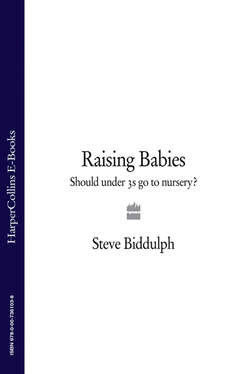Читать книгу Raising Babies: Should under 3s go to nursery? - Steve Biddulph, Steve Biddulph - Страница 31
Nursery uptake and social class
ОглавлениеIt is interesting to note that attitudes to nursery care are different in different social groups across the UK. The Sure Start programme – the government’s system of parent support centres and home visitors – has been acclaimed worldwide for providing help at the most beneficial and crucial time. Sure Start includes a range of services, among them the offering of childcare nursery places. Yet in the traditional blue-collar regions of the UK, organizers often find it almost impossible to get parents to take up the nursery places available. A centre director told the Guardian newspaper:
‘Parents round here don’t want to use day nurseries – they don’t want to leave their children with people they don’t know. This is their precious child and they don’t want to hand them over to strangers. We’re registered and inspected by OFSTED and we have qualifications, but they don’t trust all that. We’re attempting a big cultural shift.’3
The article went on to report that:
‘On the other side of Birmingham, on another large housing estate, Chelmsley Wood, the mothers at the Sure Start project have very strong views on the subject. As one of the first projects of its kind, it runs the services parents asked for – a drop-in centre, programmes to support parents, encouraging them to read and sing nursery rhymes with their children – but it has no daycare. One of the mothers, Kate, is planning to go back to work, but only when her son is at school: “Tom is my only child, he’s so precious. I’m frightened and not sure about daycare. It would worry me too much, that he was spending too much time with other people.”’
Another mother, Clare, went back to work after three months with her first child. That was eight years ago, and this time around she’s determined to do it differently: ‘I missed out on so much and I said I would never do that again. I will wait until my children are in full-time school.’
Blue-collar parents are much more reluctant to use nurseries than the middle classes. So are immigrant parents and refugees. A higher value is placed on family cohesion among the poor, and often it is all that stands between them and annihilation. Many US daycare centres now deliberately recruit staff from Hispanic backgrounds because these young women tend to be more loving, tender, patient and good humoured – more natural, and good with children. Parents prefer them. White carers tended to be more self-centred, less caring and colder. Are those cultures that are closer to an agrarian, family-oriented way of life the last receptacles of the ability to love children? What does that say for where we are heading?
